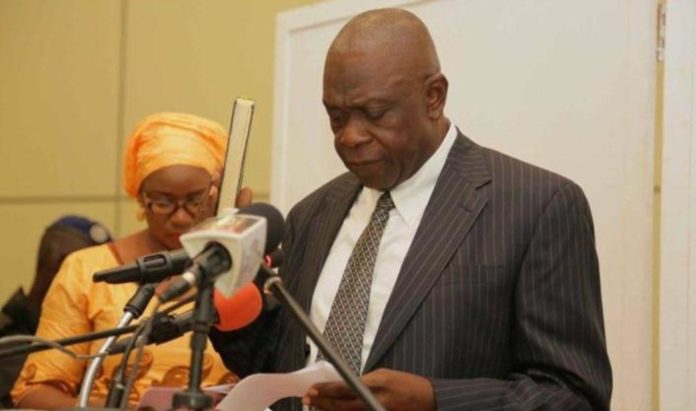By: Kebba AF Touray
The Minister of Finance Amadou Sanneh, yesterday presented the estimates of revenues, recurrent and development expenditure, for the fiscal year 2018, before the country’s lawmakers.
Mr. Sanneh revealed that the country’s economy is expected to grow by 5.3 percent in 2017, compared to an actual outturn of 2.2 percent in 2016; that growth in the agricultural sector is expected to rebound to 5.5 percent this year from 0.5 percent in the preceding year; that industry is expected to rise from 3.1 percent in 2016, to 6.5 percent; that the service sector is anticipated to endure a slight set back form 5.1 percent in 2016 to a forecast of 4.5 in 2017; that this is due mainly to the negative impact of the December political impasse, affecting the tourism sector, resulting in zero occupancy over the period January to March 2017.
“Development in the monetary policy rate signals improvement in access to affordable financing, with the rate falling from 20 percent starting 2017, to 15 percent at end July 2017. Money supply in September 2017 grew by 22.0 percent, compared to 8.3 percent in the same period in 2016; that this reflects a significant increase in the net foreign assets of the banking system”, said Finance Minister.
He stressed that the economy is recovering from the late 2016 to early 2017 political impasse and his ministry remains steadfast and determined, to continue to pursue fiscal, financial and structural reforms needed to steer the economy into a sustainable path.
On the fiscal front, he stated that as of end 2016, Net Domestic Borrowing (NDB), reached D4 Billion, which equals to approximately 10 percent of nominal GDP, compared to a target of 1 percent NDB to GDP, which illustrates a growing budget indiscipline and fiscal pressures in recent years that have led to an unsustainable debt situation. This scenario according to him, has improved in 2017 with NDB being limited to less than 1 percent of GDP at the end of September, due to the stabilization program with development partners notably, EU, ADB, WB and IMF.
Mr. Sanneh said that Preliminary estimates have shown an increase on domestic revenue of 2.1 percent over 2016, while the GRA revenue collection currently stands at 2 percent less than the cumulative target for January to March due to a slowdown of business activities across the country.
On the Expenditure front, he disclosed that total expenditure and net lending, has reached around D 8. 7 billion as of end October, which is 1.9 percent less than the 2016 figure of 8.87 billion , while the components of current actual expenditure comprises wages and salaries; that capital expenditure has increased from January to October by 6 and 9 percent respectively, whereas other charges decreased by 11 percent compared to the same period in 2016.
He also disclosed that the fiscal deficit is expected to be around 1 percent of GDP by end December 2017, which is in line with their target; that if attained, this would herald major improvement on the country’s fiscal operations compared to previous years, when NDB to GDP escalated to 11 percent.
Mr. Sanneh also unveiled that the total revenue and grants in 2018, is projected at D 19.399 billion, representing an increment of 63 percent over the 2017 figure of 11. 909 billion; that this is due mainly to an increase in project grants performance.
“The project grants are estimated to increase from D782 million in 2017, to D8.24 billion in 2018, whilst there is also budgeting for budget support to the tune of D1.96 billion. This is expected to come from development partners in 2018”, explained Mr. Sanneh.
He averred that total expenditure and net lending is projected to increase from D12. 359 billion in 2017 to D20.617 billion in 2018, representing 67 percent increment, the bulk of which is attributed to the capital budget that is fully financed by development partners; that personnel expenditures are expected to slightly decrease from D2.682 billion in 2017 to D2.506 billion in 2018 as government incentives to conduct a nationwide staff audit, which led to the discovery of several ghost workers within its payroll.
Debt interest according to the Minister, is projected to consume around 27 percent of Government’s tax revenues in 2018 compared to 34 percent budgeted in 2017, moving from D2.768 billion in 2017 to D 2.288 billion in 2018, which reduction is due to declining interest rates on government short term debt instruments; that other current non interest expenditure, is estimated to increase from D5.14 billion in 2017, to D9.86 billion in 2018.
“This reflects our intention to further spend on social sectors namely health, education, agriculture and tourism, to improve and expand service delivery and achieve better outcomes for all citizens”, he cited.
Finance Minister Sanneh also stated that Capital spending is estimated to increase from D1.770 billion in 2017 to D5.968 in 2018, due mainly to various ongoing road and infrastructure projects, whereas in financing the deficit, net domestic borrowing is projected to decrease slightly to D528 million in 2018, representing 1 percent of GDP, compared to D534 million in 2017.
“I remain convinced that this budget will be a useful tool in our drive to achieve and sustain macroeconomic stability and the government’s primary objective of reducing poverty and improving basic service delivery for all, if we all recommit to strict fiscal discipline. I therefore submit the estimates of revenues, recurrent and development expenditures for the fiscal year 2018, for consideration and approval, by the National Assembly”, he concludes.



















